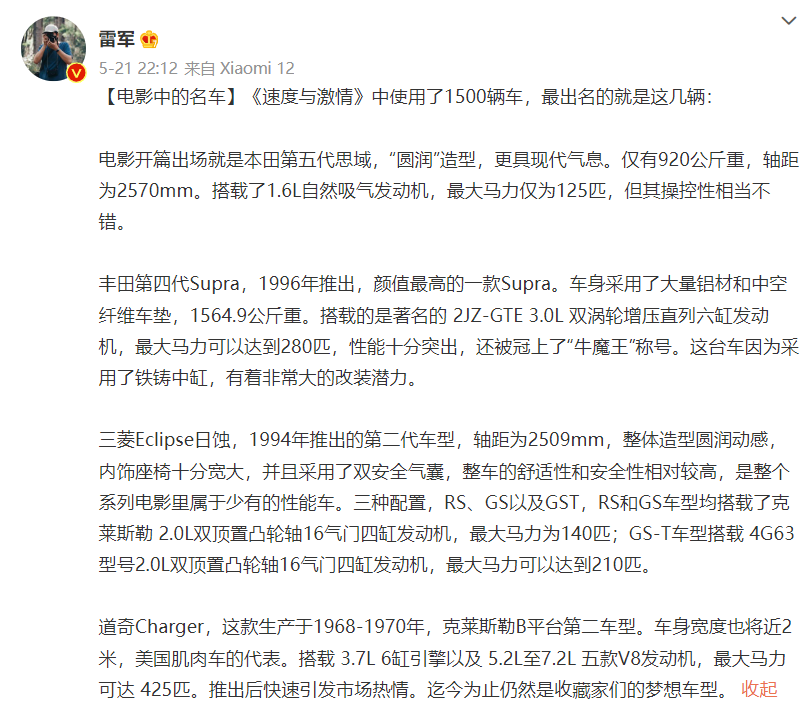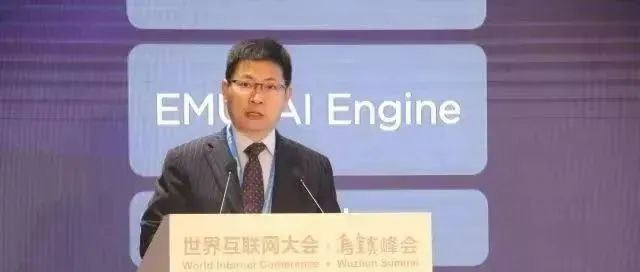Author: Leng Zelin
Editor: Wang Pan
Since taking over as CEO of Huawei’s Intelligent Automotive Solutions BU last year, Yucheng Dong, a “newcomer” in the automotive industry, has been appearing more frequently at various new energy forums. He attended the full-stack dynamic forum held at the Greater Bay Area Auto Show at the end of May and immediately appeared at the Automotive Blue Book Forum after launching a new car in early July.
However, for Yucheng Dong, it is not enough to just “be seen” at these events- “standing out” is the best way to create publicity.
Similarly, Lei Jun, who has been “fighting” with Yucheng Dong in the mobile phone industry for more than ten years, started to “make trouble” in May by announcing that he would use his spare time to become a car blogger, which is obviously to promote and transform Xiaomi’s car release.
So far, Lei Jun has also served as a “photography blogger,” “IT blogger,” and officially been listed as a “popular financial blogger” by Sina.
Lei Jun’s attitude towards learning about things is undisputed. Before Xiaomi was founded, he could take out a row of mobile phones from his bag and start explaining them. In May, netizens reported that Lei Jun was standing in front of a row of supercars, experiencing them one by one, inside Xiaomi’s science and technology park.
However, a part-time job is still a part-time job. After posting a few Weibo messages about car movies and car models, Lei Jun turned around and plunged back into mobile phones and photography. After all, Xiaomi’s current goal is to challenge the high-end mobile phone market, while cars are not yet Xiaomi’s main business in the short term, so they naturally need to sort out their priorities.
According to Xiaomi’s marketing guidelines (Lei Jun has posted an average of about 3 Weibo messages per day from 2010 to the present) and Yucheng Dong the pioneer, the day Xiaomi’s cars go on sale is probably around the time Lei Jun officially becomes a car blogger.
Two people who have been immersed in the mobile phone industry for more than a decade are now switching to the automobile industry, which has a history of over 100 years. It is difficult to connect their knowledge reserves and familiarity with the market in a short period of time, so it is inevitable that they will take the road of empiricism and bring the same methods from the mobile phone circle into the automotive circle.
In the past, in the mobile phone circle, Lei Jun created the Lei Shi Comparison Method, which was inherited and further developed by Yucheng Dong. Now, using the slogan “help car companies make good cars,” Yucheng Dong takes the mobile phone model into the automotive circle one step ahead of Lei Jun.
Before Yucheng Dong and Lei Jun entered the automotive industry, the flow of new energy topics had always relied on several founders of the new forces.
For example, Libin’s “places where gasoline cars can go are places where electric cars can also go” and “why are people still buying gasoline cars,” Li Xiang’s “a group of technical jokes” and “the most luxurious car under 5 million,” and He XPeng’s “the core of the smart car is operation,” and so on.Reasons behind it, besides the saying of “butt decides the brain”, cold start is also an indispensable part of the new forces in the automobile industry.
As a car enterprise without any background in car manufacturing, it was almost impossible for the new forces at that time to promote and penetrate new energy vehicles with a penetration rate in the single digits. By using some explosive phrases to “break the circle”, they solved the problem of survival first before solving reputation issues.
Recalling the new energy topic in recent years, the terms extended range, battery swapping, and pure electric have all gone from initial industry disdain to now being recognized. The words from the founders have played an important role in this development.
However, with the increasing attention paid to new energy, public opinion has become a double-edged sword. Expressing some relatively “biased” views can indeed attract a lot of traffic, but it is also extremely easy to damage the brand image. Therefore, Li Bin stated at the beginning of the year that he should be cautious in his words, and his Weibo account had only one New Year greeting and one promotion of the ES7. He XPeng also only dared to limit the area of promotion for the G9 to within 500,000 yuan. Only Li Xiang and Yu Chengdong engaged in comparisons, with one using the term “one million” and the other using “five million,” perhaps because they were on the same track of asking questions and pursuing ideals.
However, the new forces have gradually withdrawn from the second line of public opinion, and the mobile phone manufacturers have taken up the banner, with Yu Chengdong being particularly prominent among them. In addition to the million-level rhetoric mentioned above, Yu Chengdong also stated that he hopes to achieve annual sales of 300,000 units in the first year and help car companies become the world’s number one, etc.
In comparison, mobile phone manufacturers have fully played their “traditional advantages,” such as when the Wanjie M5 with an extended range was released, its acceleration and torque were compared to conventional vehicles, while its range was compared to pure electric vehicles. When the Wanjie M7 was released, the acceleration performance of the four-wheel drive was compared to that of conventional fuel vehicles and the rear-wheel-drive Model Y, and the size was compared to the data for the L113 with a short wheelbase.
Of course, the most classic is the comparison chart of “the ten-sided warrior.” This has been criticized by many industry insiders, such as He XPeng, CEO of XPeng Motors, and Li Ruifeng, CEO of Eve Energy. They have publicly voiced their opposition to Yu Chengdong’s remarks, but with the high sales of Wanjie, Yu Chengdong obviously does not listen.
Forced business does not equal frivolous talk. This year, Yu Chengdong has repeatedly emphasized the issue of gasoline-powered cars being outdated, such as buying a gasoline-powered car now being like buying a functional phone in the era of smartphones or suggesting phasing out pure gasoline-powered cars as soon as possible. Although most people agree that gasoline-powered cars are on the decline, it is still strange to hear these words from Yu Chengdong’s mouth. Someone from the mobile phone industry coming into the automotive industry and beginning to “guide the professionals” seems a bit odd.Actually, if you’ve watched Chengdong Yu’s car launch conference and compared it to other car companies’ launch conferences, it’s clear that Chengdong Yu doesn’t know enough about cars. In addition to repeatedly using “high-end” and “luxury” to describe cars in the conference, there are hardly any other words to describe the vehicles themselves.
The same is true for Lei Jun.

Although Lei Jun claims to be a car blogger, the few Weibo posts he has made about cars are either storytelling or Baidu-style explanations, making them look more like his own learning notes.
However, Xiaomi’s car has not yet been unveiled, and Lei Jun has to rely on online promotion, while Chengdong Yu, as CEO of the smart car solution BU and terminal BG of Huawei, also has to do the same in the face of the urgent need for new business in Huawei.
The outside world is not opposed to newcomers entering the field. The collision between cell phones and smart cars can produce new sparks. However, if you lose respect for the market rules and humility as a newcomer, you are bound to face some backlash.
Li Ruifeng recently criticized Chengdong Yu’s statements about range extender, posting six Weibo posts targeting him.
In fact, Li Ruifeng is not the first person among traditional car companies to express dissatisfaction with the new forces. High-ranking executives from Volkswagen, Great Wall Motors, Geely, and others have expressed their dissatisfaction before.
The reason behind this is that all car companies have spent time and money developing various complex hybrid systems, which do require more technical expertise than range extenders. However, consumers invest their capital in car companies that promote features like in-car entertainment systems and seats, which makes people feel that “bad money drives out good money.”
However, if you carefully examine why the new forces sell better, you’ll find that they have a better insight into consumers’ needs. Even Chengdong Yu and Lei Jun have limited knowledge of cars, and consumers in the market also find it difficult to understand the differences in technical details. Consumers are more concerned with results rather than processes.
Therefore, to some extent, Chengdong Yu, who “doesn’t know cars”, is less constrained and can focus on addressing consumer needs rather than solving technical challenges, which may be the reason why the industry is thriving.
At present, it’s not a bad thing for the collision between new and old forces as autonomous brands rise. However, as new forces bring intelligence to cars, they must also respect the development of technology; while traditional forces focus on research and development, they also need to look up and see the market’s needs.
This article is a translation by ChatGPT of a Chinese report from 42HOW. If you have any questions about it, please email bd@42how.com.
